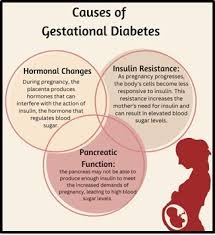Early GDM Screening Key to Maternal, Child Health
Why in News ?
World Health Day 2025 emphasized maternal and newborn health under the theme “Healthy Beginnings, Hopeful Futures.” Experts highlighted the need for early screening of gestational diabetes by the 8th week to prevent long-term health risks for both mother and child.
Importance of Early Screening for Gestational Diabetes:
- World Health Day 2025 theme: “Healthy Beginnings, Hopeful Futures” focused on maternal and newborn health.
- Gestational Diabetes Mellitus (GDM) increases the risk of type 2 diabetes in mothers and metabolic disorders in children.
- Traditionally diagnosed between 24–28 weeks, but evidence now supports screening as early as the 8th week.
- Early maternal hyperglycemia can program the foetus to develop long-term health issues, including obesity and insulin resistance.
- Early glucose testing can help prevent foetal hyperinsulinemia and reduce future complications.
Need for a Policy Shift in India
- India has over 77 million diabetics; 20% of pregnant women develop GDM.
- Late antenatal checkups and traditional guidelines delay diagnosis, missing the early window for prevention.
- Indian women are genetically more prone to insulin resistance, making early diagnosis even more crucial.
- Lack of awareness among healthcare workers and women about first-trimester hyperglycemia is a major hurdle.
- Diabetologists advocate primordial prevention—preventing the condition before it develops.
Recommendations and the Way Forward
- Glucose screening should be done by the 8th week of pregnancy.
- If postprandial glucose >110 mg/dL, early intervention with diet, exercise, and low-dose metformin can help.
- Experts suggest revising national guidelines to include first-trimester screening.
- Ensuring affordability, awareness, and access to early testing is key.
- A coordinated effort among policymakers, healthcare providers, and public health institutions is vital.




